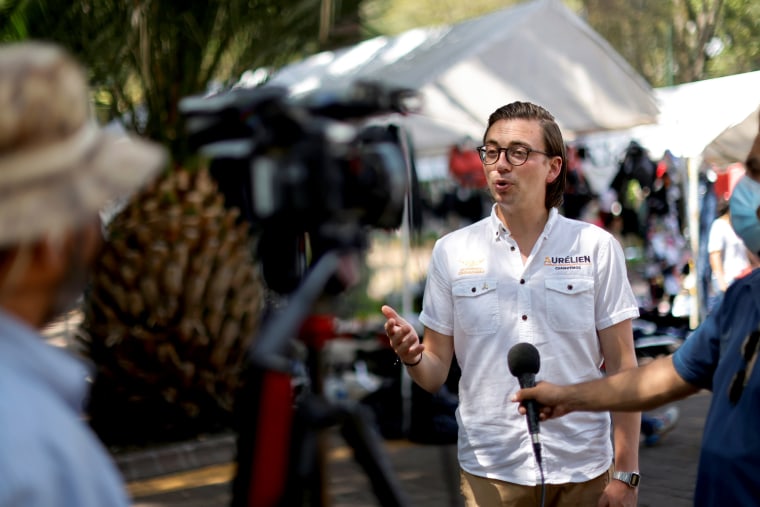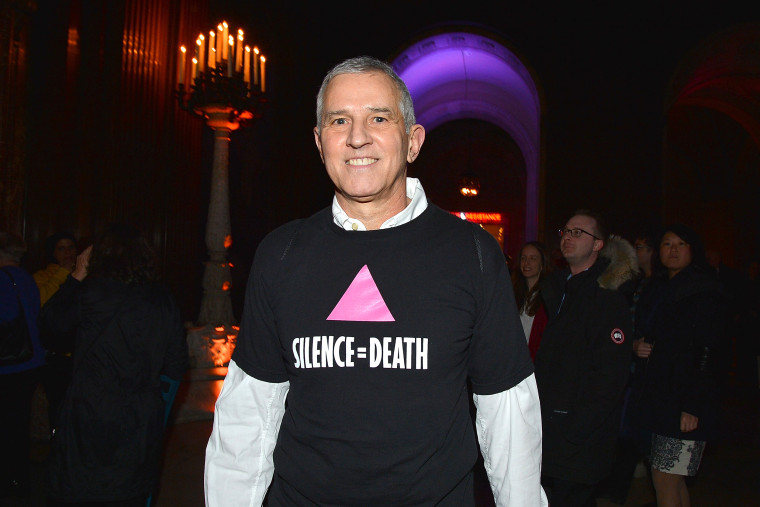‘Keeps me up at night’: Doctors who care for transgender minors brace for bans
Dr. Stephanie Ho, a family medicine physician in Fayetteville, Arkansas, said she’s had state legislators in her exam room before.
Ho, who has provided gender-affirming care to transgender people in the state since 2015, is also an abortion provider, so she is familiar with lawmakers’ restricting the care she provides. She said she wasn’t surprised when the Legislature overrode Gov. Asa Hutchinson’s veto of a bill last month that would ban puberty blockers, hormones and surgery for transgender minors.
“I think that it’s kind of ridiculous that we’ve gotten to the point that we’re letting politicians dictate how health care is delivered and what kind of care can be given to whom,” said Ho, a fellow with Physicians for Reproductive Health.
“I think the last thing I’ve ever wanted, being an abortion provider or somebody who provides gender-affirming care, is to have a politician in the back of my mind in the exam room making me think about ‘Oh, I wonder if I should do this, if it’s OK,’” she said. “They’re essentially trying to practice medicine without a license. And that’s incredibly wrong.”
Arkansas was the first state to pass a ban on transition care for minors. Tennessee Gov. Bill Lee last week signed a similar billbarring prepubertal youths’ access to transition care like hormone therapy. Advocates say no doctors in the state provide hormone therapy for prepubertal youths, The Associated Press reported.

Florida Gov. Ron DeSantis bans transgender women and girls from high school sports
So far this year, state legislatures have considered 35 bills to ban or limit gender-affirming care for trans minors, according to the Human Rights Campaign. Physicians say that the bills negatively affect their patients’ health before they even become law and that they require doctors to go against medical standards of care. Legal experts say the bans could also open providers and hospitals up to lawsuits or put them at risk of losing federal funding.
Ho is trying to support her patients as best she can until Arkansas’ law takes effect this summer.
“It’s just a matter of making sure that my patients know that, whether I can provide them hormones or not, we’re still here for them to support them in any way that we can,” she said. “Of course, I’m going to practice within the bounds of the law, whether I agree with it or not, because me being in jail doesn’t help any of my other patients at all.”
Creating ‘contingency plans’
Some physicians, like Dr. Izzy Lowell, who founded a telemedicine practice called QMed in Atlanta in 2017, started planning for the bills months ago.

In April, Alabama’s Senate passed a bill that would have made it a felony for doctors to provide minors with gender-affirming care. The bill died Monday after the House missed the deadline to vote on it. Lowell said that when it first passed, the minor patients she treats in Alabama were scared and frustrated.
“It was clear that the state of Alabama was coming after transgender teens, and we talked about some contingency plans,” she said. “Based on each case, I tried to give them as many refills as possible and told them: ‘Go pick up as much of your medicine as you can. I don’t know when I’ll see you again.’”
Lowell is licensed and practices in 10 states via telemedicine, so she also talked with her legal team and with patients in states considering bans about how her patients could continue care should their states ban it. She said her patients’ parents would have to drive to other states, which would “place an extraordinary burden on these families.”
“If they were, for example, able to get over the border into Tennessee or South Carolina and sit in a parking lot somewhere, I could see them technically with my South Carolina license or Tennessee license or my North Carolina license and perhaps find a local pharmacy there and have them pick up the prescription, but it would be a day’s worth of driving for them to get somewhere where I could see them legally,” she said.
Because leaving the state just to get care would be a burden, families in states where transition care restrictions have passed have movedor are considering moving.
The costs of losing ‘lifesaving’ care
Many minors whose parents don’t have the time or money to drive out of state would be forced to stop transition care if their states passed laws like Arkansas’, which comes with potentially life-threatening health risks, physicians say.
Major medical organizations, including the American Medical Association, the American Academy of Pediatrics, the Endocrine Society and the American Psychological Association, support gender-affirming care for trans youths and oppose efforts to restrict access.
Supporters of the Arkansas bill argue that transition care for minors is “experimental” and that trans minors often change their minds about their genders and detransition later in life. Medical experts say neither of those claims are backed by scientific evidence. On the contrary, research has found that access to gender-affirming care such as puberty blockers reduces the risk of suicide among trans youths.
Ho said the danger is evidenced by what happened when Arkansas’ bill passed through one legislative chamber. Dr. Michele Hutchinson, a physician at the Arkansas Children’s Hospital Gender Spectrum Clinic, testified before the state Senate in March that there were “multiple kids in our emergency room because of an attempted suicide, just in the last week,” after the House passed the bill.
Ho said that “since then, I have had one of my own patients attempt suicide,” adding that she has talked to her patients about what would happen if a judge doesn’t block Arkansas’ law from taking effect. The law also bars her from referring her patients to other physicians who provide gender-affirming care. Unless her patients were able to leave the state, they would be likely to lose access to hormones, so she talked to them about what that would mean.
Lowell said forcing people who were assigned female at birth to stop testosterone would cause them to suffer symptoms of low testosterone, which include inability to concentrate and low energy. “They would start doing badly in school most likely, until their bodies started producing estrogen a few months later, and then they would restart their periods, restart breast growth, and it would undo all of the changes that we tried to achieve with testosterone.”
If people assigned male at birth were forced to stop taking estrogen, it “would be like going through instantaneous menopause,” Lowell said. For about a year, they could have symptoms like hot flashes, night sweats, irritability and mood swings, among other issues, such as negative impacts on emotional well-being.
Doctors worry that minors who already receive and rely on transition care would get hormones illegally if they had to. Dr. Ricardo Correa, a board member of GLMA: Health Professionals Advancing LGBTQ Equality, treats trans veterans in Phoenix, where, he said, trans people have traveled to the border to buy hormones illegally when they can’t get them. He said state bans would worsen the problem.
“It will just create chaos in the system from black markets that are going to start selling this kind of medication in that state,” he said.
Lowell said that hormone therapy is safe when it is monitored by a doctor but that using it without medical supervision could cause health problems, such as liver failure, kidney failure or heart problems.
“There’s very serious consequences of completely unmonitored, sort of black market medication use in this situation,” she said.
‘A form of medical malpractice’
Legal experts and advocates say that in addition to having dangerous health impacts, bans on gender-affirming care for transgender youths could expose health care providers to legal and regulatory problems.
Valarie Blake, a law professor at West Virginia University specializing in health care law, said there’s “a pretty strong case” that Arkansas’ law is discriminatory under Section 1557 of the Affordable Care Act, which protects against discrimination based on sex.
The Biden administration announced this month that it would interpret Section 1557 to protect against discrimination based on sexual orientation and gender identity — reversing a Trump-era policy that cut protections for transgender people.
Hospitals and physicians receiving federal funding, such as Medicare and Medicaid payments, are required to comply with laws like Section 1557, Blake said; otherwise, they risk losing the funding.
Arkansas’ law could trigger that risk by allowing physicians and hospitals to prescribe puberty blockers and hormones to cisgender minors for precocious puberty but not transgender teens.
“If the reason that they’re not doing it for transgender teens is because of the fact that they’re transgender, then there’s a very good case that the reason that they’re refusing the treatment is based on the gender identity and not anything else,” Blake said.
“It really puts health care workers in an untenable position when the federal government makes it plain that this is discrimination and has the money to back it up to basically say, ‘We can pull away all of the resources,’ and yet the state persists,” she said.
The American Civil Liberties Union argued in a lawsuit it filed Tuesday against Arkansas that the trans health restrictions are unconstitutional, but Blake said that’s not set in stone.
“We don’t have clear precedent on the books yet to suggest that LGBTQ categories are fully protected in that manner, which is why we’ve been seeing various kinds of Equal Rights Amendment-type laws trying to work their way through Congress,” she said, referring to the Equality Act, a bill that would protect LGBTQ people from discrimination in housing, employment, public accommodations, education and other areas of life.
The bill passed the House in February, but it has stalled in the Senate. “If something like that passes, then suddenly Arkansas as a state is in big trouble,” Blake said.
Lowell said thinking about the potential legal issues “keeps me up at night.” Physicians are required to give patients several months’ warning when they can’t see them anymore and to do their best to find other providers who can see them if they’re unable to.
But laws like Arkansas’ bar physicians from referring patients to other providers for transition care. “In this case, I can’t do any of those things, and I just have to say, ‘Bye,’ and ‘I’m not allowed to see you anymore,’” she said. “That’s patient abandonment, which is a form of malpractice.”
Lowell said that when the first restrictions were introduced several months ago, she felt angry and anxious all the time.
“I worry about what might happen to my patients if these bills are passed and worry about going to jail myself,” she said. “I struggle with the question of what I would do: continue to support my patients and risk going to jail for years or follow these hateful laws? Thankfully, I have not had to answer this question yet, but I will never abandon my patients.”








